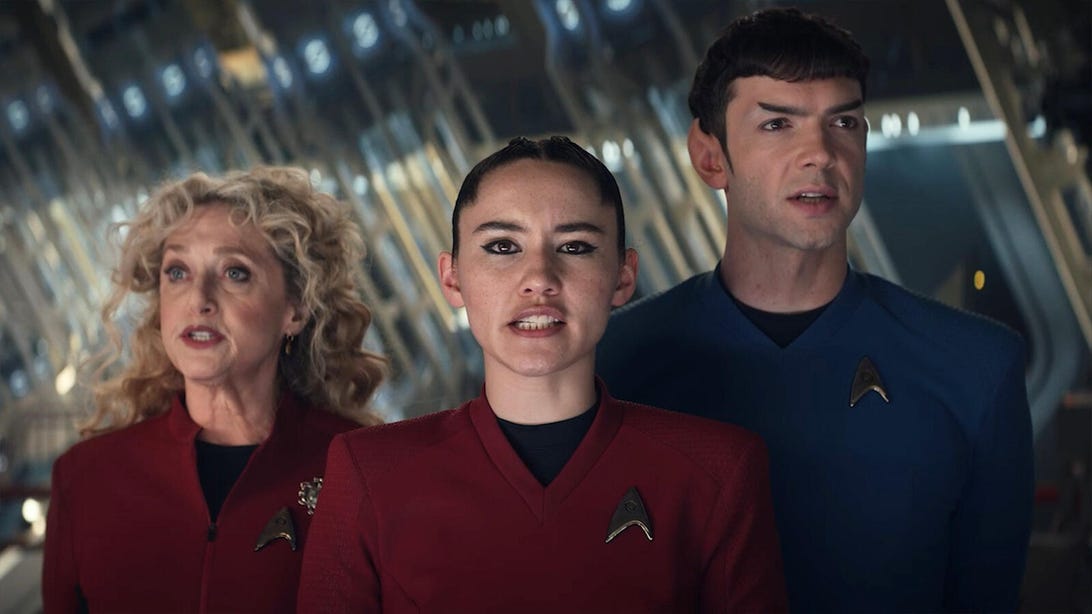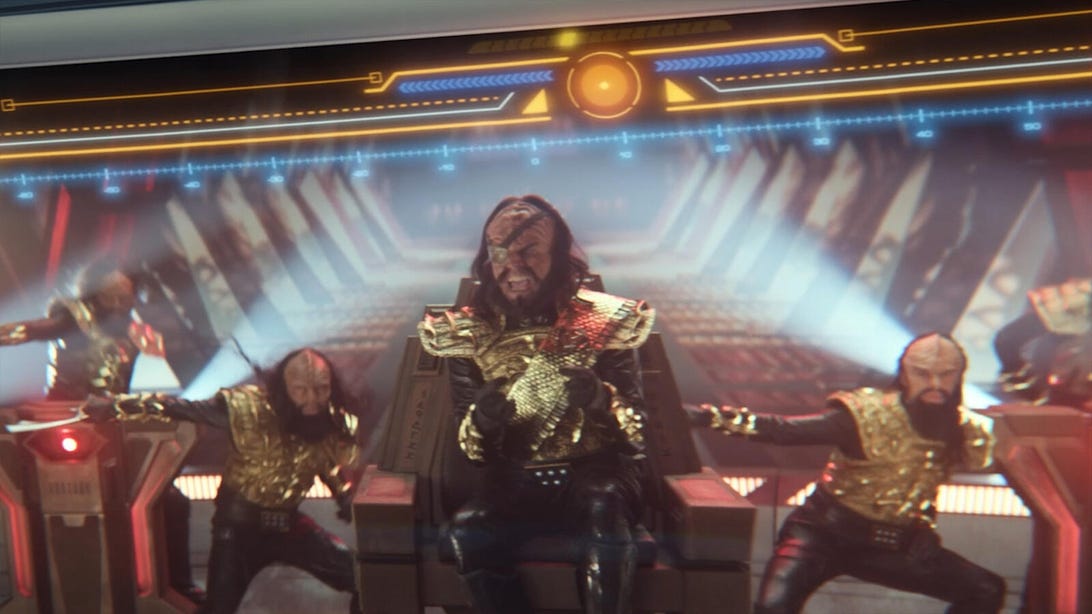Join or Sign In
Sign in to customize your TV listings
By joining TV Guide, you agree to our Terms of Use and acknowledge the data practices in our Privacy Policy.
Star Trek: Strange New Worlds' Bosses Explain How They Made the Musical Episode Work for Star Trek
And which cast member surprised them the most with their musical talents

Carol Kane, Christina Chong, and Ethan Peck, Star Trek: Strange New Worlds
Paramount+[Warning: The following contains spoilers for Season 2, Episode 9 of Star Trek: Strange New Worlds, "Subspace Rhapsody." Read at your own risk!]
Song. The Final Frontier.
With "Subspace Rhapsody," the ninth episode of the second season of the Paramount+ series Star Trek: Strange New Worlds, the venerable sci-fi franchise really did boldly go someplace it hasn't gone before in its 57-year history: a musical episode.
No, Kirk doesn't show up singing "Rocket Man," nor does Spock warble through "The Ballad of Bilbo Baggins" – this wasn't an in-joke, parody, holodeck-generated retro rationale or even a scene-specific one-off performance like Data crooning "Blue Skies": It was a real-deal, full-blown musical episode filled with Pike, Number One, Uhura, La'an and the rest of the crew baring their souls in song, thanks to a clever bit of sci-fi logic.
Showrunners Akiva Goldsman and Henry Alonso Myers opened hailing frequencies with TV Guide for a peak behind the scenes of how the tried-and-true concept of the musical episode was tailor-made to suit Star Trek's uniquely specific genre, and how long-simmering ongoing plotlines were pushed significantly forward. And they reveal that, as hotly as the Strange New Worlds fanbase has been anticipating the episode, no one was more excited by the prospect than the cast – even those actors who didn't think they could carry a tune.
We know that musical episodes tend to work out pretty well on many types of shows, but Star Trek is always its own unique beast. Tell me about the decision-making process that you went through to realize, "It's going to work in the framework of our show."
Henry Alonso Myers: I think musicals are much harder to do than people probably realize. They seem very light, they seem like they're easygoing, and what they actually are is tons and tons and tons of planning. Akiva has always wanted to do a musical on the show, and I had done some musicals on some other shows, so I had a little experience producing this. So we spent a lot of time trying to make sure, "How do we do this now on the show as something that felt like Star Trek?"
We basically knew that you couldn't just do an easygoing Episode 17. "Well, maybe we'll get away with a couple of songs and that's it." We needed to do something that we hoped would be good because people who love musicals will love it, but people who love Star Trek – It was absolutely crucial that it also be an episode of Star Trek and that we should do both, because that had not been done. And there are many reasons it hadn't been done, but the main one, I think, is that it's just really, really, really hard! When you're doing 22 episodes in a season, you often don't have enough time to do all the things that are required to actually put a musical in place.
There were certainly ways to figure out a science fiction conceit to get you into that musical mode, but you also baked in these stories that had been percolating throughout the entire season, in an episode that you could have just decided "We're just going to keep everything self-contained, so if the fans want to put this in a little corner by itself..." But no, this is very important to the progression of the characters throughout the season. Tell me about finding that sweet spot.
Akiva Goldsman: Well, although yes, I know what you mean when you say we could have done something self-contained, we also couldn't, because our character arcs are serialized and Episode 9 is a very significant episode when you are building character arcs that will end in Episode 10. So actually, our first obligation was to service the character stories and the musical became a wonderful opportunity to do that. But if we couldn't have done that musically, we wouldn't have done it as Episode 9.
Inside the Making of Star Trek: Strange New Worlds' Musical Episode
Tell me about landing on the right style of music to use, both throughout the episode – songs that were going to fit together – and also that spoke to each character's musical expression.
Myers: Well, it's interesting: when we were breaking the story, we knew what the story would tell for each one of them. We had an idea of what we were trying to get at. The important thing to us was to give the musical a premise that would reveal something to the audience, so that it was an actual scene. It was a scene that started in a different place from where it began. But I do remember when we were having this big discussion in the room, I remember Akiva bringing a lot of, "Oh, we should talk about this kind of musical. We should talk about that kind of musical," as we were talking about the specific types that we wanted people to try.
But it ultimately came down to Tom [Polce], our composer. When we brought him on board, we had a sense of the story and we handed it to him and we sent him to set to meet everyone and get a sense of what their abilities are and really try to design each song in such a way that it's something that each actor could really respond to and do well.
That was the goal, because the big surprise was that pretty much everyone had a version of singing in them that they could do, and some were extremely experienced and some weren't, but they all brought it and it just required they worked a lot. They worked on weekends. They worked when they were on set between shoots. They worked on everything. They took classes. It was really an all-hands-on-deck. They came in and really spent a lot of time making sure that they could do the thing that we asked them to do well, and they more than exceeded it. They really rose to the occasion.
You certainly had people in the cast who were already known for their musical ability. As you went to those who maybe weren't so well known for that, can you share anything anecdotally about actors finding their confidence level? Were they nervous, but excited? Did they have to be assured that they wouldn't look silly or feel awkward throughout the process? How did it play out with some of the individual cast members?
Myers: Well, Ethan [Peck] was someone who I think did not think of himself as a singer, and then surprised everyone by having this great deep voice that none of us even realized that he had. He had an incredible ability, but part of that was about having what we had with everyone, which was having them work with someone who could help teach them to sing or make sure that the singing was coming out in the right way or they would come out in a way that comforted them.
And a lot of that was just about Tom would design the songs based on their ability, but he wouldn't ask them to go much farther than they could, but they all wanted to try farther than we expected. That was the broad strokes.

Bruce Horak, Star Trek: Strange New Worlds
Paramount+As the cast and crew got more and more excited, tell me a little bit about what that set was like during shooting and what the mood and the buzz was and how it was different from the average – if there is such a thing – episode of Star Trek: Strange New Worlds.
Myers: They all got so much happier! They were all happy to begin with, but I'd never seen them so happy to do this. I've never seen them have such a strong reaction to the script and they had learned all of the songs at that point.
Akiva, I know that you are a Day One Trek fan through and through, know the franchise chapter and verse, and there's something about this episode that really does fit with some of the lighter episodes going back to the original series. Were you the guy saying, "Yes, this is going to work," because of how it worked back then?
Goldsman: Well, I think we both were. I think Henry and I both were very sure that this was something that Star Trek could do and do well, that Star Trek is extraordinarily versatile when it comes to genre, as long as you hold emotional truth of the characters in hand. I think that people took a risk, people who weren't us, in order to close their eyes, grit their teeth and say, "Yeah, sure it'll work."
Having said that, we are gifted this incredible cast and there seems to be nothing they can't do. I think there's clearly a Cirque du Soleil episode coming next season – not really! – because we have yet to find the corner of performance that they can't inhabit. So it was really our good luck to have them and our blind faith, my absolutely ignorant desire and Henry's deeply experienced willingness, to get this thing on its feet that all conspired to make it work.
I feel Star Trek fans have always been incredibly appreciative of good music, thanks to the great scores that have been part of the franchise throughout its history. What are you looking forward to seeing in the fans' reaction to the music?
Goldsman: You said something really important here, which is, "The music is good." It's good music. We all have stories we can tell you about how it went from "a thing we were working on" to "a thing we were listening to," and that doesn't happen. In fact, it's typically the opposite, especially…I can't really speak to music per se, but after you make a TV show, you kind of never want to see it again. And so the fact that we all continue to fill our lives with this, I have watched it more times than any other episode. I have dragged people in who don't know anything about Star Trek to watch it and people who do, and I can imagine singalongs with Bouncing Balls.
It's a trip, and I think that if that's the way we feel about it, and that's typically our measuring stick, because Henry and I are Star Trek fans, if we dig it in our Star Trek selves, then the people like us should hopefully dig it too. And we dig this a lot.
New episodes of Star Trek: Strange New Worlds premiere Thursdays on Paramount+.